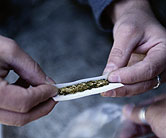- Could Your Grocery Store Meat Be Causing Recurring UTIs?
- Are You Making This Expensive Thermostat Error This Winter?
- Recognizing the Signs of Hypothyroidism
- 10 Strategies to Overcome Insomnia
- Could Artificial Sweeteners Be Aging the Brain Faster?
- Techniques for Soothing Your Nervous System
- Does the Water in Your House Smell Funny? Here’s Why
- Can a Daily Dose of Apple Cider Vinegar Actually Aid Weight Loss?
- 6 Health Beverages That Can Actually Spike Your Blood Sugar
- Treatment Options for Social Anxiety Disorder
ADHD Linked to Earlier Use of Illicit Drugs in Teens: Study


Among people who use illicit drugs, those with attention-deficit/hyperactivity disorder (ADHD) start using them one to two years earlier in their youth than those without the disorder, a new study finds.
The findings show the need to begin substance use prevention programs at an earlier age among teens with ADHD, the University of Florida researchers said.
“The take-home message of this study shouldn’t be that children with ADHD are more likely to become drug users. Rather, seemingly ‘normal’ teenage behavior, such as experimenting with tobacco or alcohol use, may occur at younger ages for individuals with ADHD,” lead author Eugene Dunne, a doctoral student in clinical and health psychology, said in a university news release.
In the study, Dunne’s team looked at questionnaires completed by more than 900 adults who had used illicit drugs in the past six months. Of those, 13 percent said they had been diagnosed with ADHD.
On average, those with ADHD began using alcohol at age 13, about 1.5 years before those without ADHD. Among participants who injected cocaine, those with ADHD began doing so at an average age of 22, two years earlier than those without ADHD.
While the study could point to an association between ADHD and earlier-onset substance abuse, it could not prove cause and effect.
Still, Dunne said the pattern of abuse fit the typical “gateway” theory of substance abuse, “with alcohol being the first reported, followed very closely by cigarettes, then leading to marijuana and eventually more illicit drugs such as cocaine and heroin.”
“Our study also found that current risk behaviors for HIV, such as injection drug use and needle-sharing, were associated with ADHD history, so perhaps impulsivity and other ADHD symptoms might continue to be a factor in adult decision-making,” he added.
People with ADHD who use illicit drugs may be trying to self-medicate some of the symptoms of their disorder, some experts believe.
“Stimulant drugs such as nicotine and cocaine might be used to counter symptoms of inattention, while alcohol and marijuana may be used to counter feelings of hyperactivity or impulsivity,” Dunne said.
One expert agreed with that notion.
“A good number of these ADHD patients also suffer from anxiety symptoms for which substances like alcohol and other depressants help them with their anxiety symptoms and transiently elevate their mood,” said Dr. Jatinder Chawla, child and adult psychiatrist at Winthrop-University Hospital in Mineola, N.Y.
Another expert cautioned, however, that the study in no way means that children with ADHD are destined for substance abuse.
“The findings from this study may alarm and frighten parents of children or teens with ADHD,” said Dr. Andrew Adesman, chief of developmental and behavioral pediatrics at Cohen Children’s Medical Center of New York, in New Hyde Park, N.Y.
However, he added that “no information was provided in the study about the type of ADHD that these individuals reportedly had, or whether they ever received effective treatment.”
Both of those factors may influence “risks and patterns for later drug use,” Adesman said.
The study was published in a recent issue of the journal Addictive Behaviors.
More information
The U.S. National Institute of Mental Health has more about ADHD.
Source: HealthDay
Copyright © 2026 HealthDay. All rights reserved.










